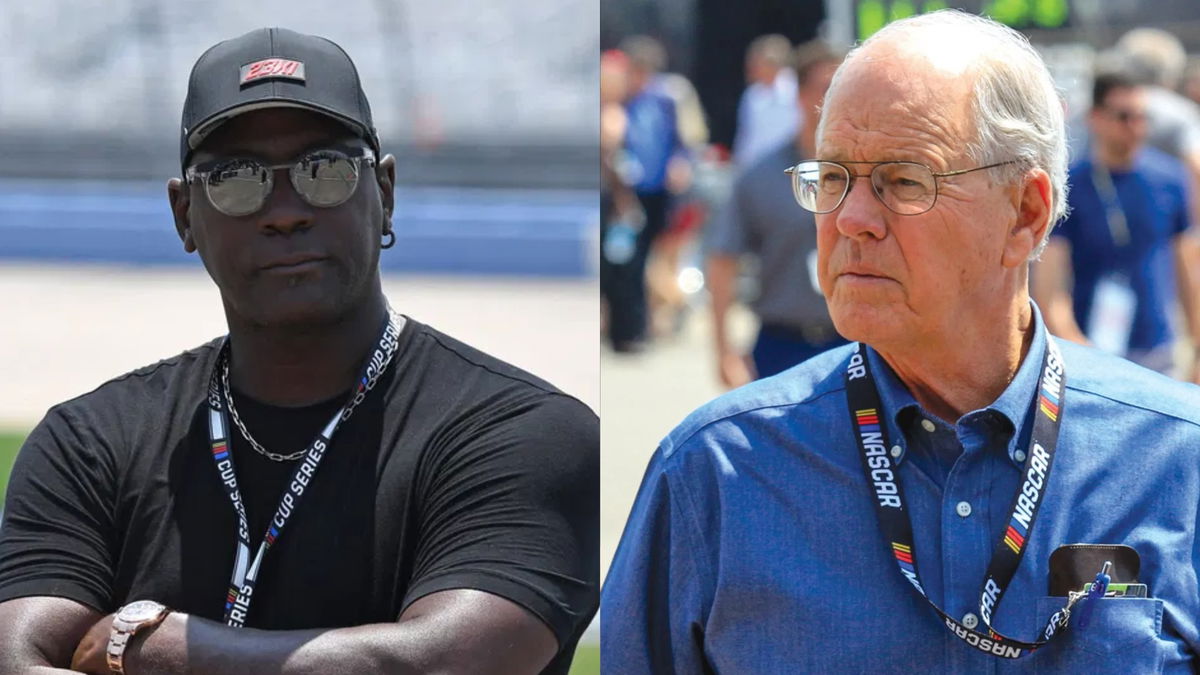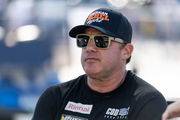
Imago
Image Credits: Imago

Imago
Image Credits: Imago
Just when everyone thought that NASCAR and the two teams, 23XI Racing and Front Row Motorsports, were ready to shake hands on the ongoing intense lawsuit, talks about reaching a settlement sliced through the legal chaos like a late-lap pass. Five days before the ‘settlement’ hearing, the two teams dropped a bomb.
Watch What’s Trending Now!
On Wednesday, 23XI Racing and Front Row Motorsports disclosed explosive text messages in a court filing as part of their antitrust lawsuit against NASCAR. And thanks to FOX Sports’ Bob Pockrass, the messages, sent three years ago, have come to light. Turns out, NASCAR President Steve O’Donnell and Executive Vice President Ben Kennedy have some pretty big reasons for making the teams sign the refined charter system last year.
ADVERTISEMENT
Steve O’Donnell’s texts reveal NASCAR’s must-win scenario
O’Donnell didn’t hold back. Sharing his thoughts about 23XI co-owner Curtis Polk, he said, “Curtis thinks we (NASCAR) are dumb hillbillies… I want to win, and I know you do as well. It is personal now — we are against a guy who doesn’t care one bit about this sport.” He laid out threats bare, from private equity players indifferent to short-term returns to international series run by teams themselves. The messages also included an extensive breakdown of potential market threats, likening NASCAR’s situation to PGA Golf facing LIV Golf, highlighting guaranteed payouts for drivers, private equity interests, and international racing ventures that could undermine NASCAR’s future.
The messages revealed a sport on edge, looking nervously at golf’s appeal, where Saudi-backed LIV Golf lured top players away from the PGA Tour. He painted a doomsday scenario of guaranteed multi-million dollar payouts tempting drivers away, calling it a real threat that could devastate NASCAR if ignored. O’Donnell spelled out the stakes bluntly:
“I don’t ever want to see you in that position. We need to lock ourselves in a room and war-game this thing. Future of the sport is on the line and we need to assume — unfortunately — that 30 of 36 drivers will leave us and all owners will leave us… if we don’t want that to be the case, what should we do? And what do we really think is fair?” Kennedy’s replies struck a similarly strategic chord, but with a focus on opportunity.
ADVERTISEMENT
It was a scenario planning paired with revenue diversification. He wrote about broadening NASCAR horizons beyond broadcast deals into international markets, sports betting, and even NFTs, framing the challenge as both defensive and creative. He also emphasized that no one had all the answers and that someone needed to constantly monitor emerging trends in sports consumption and media, suggesting forward-looking tabletop exercises to anticipate threats. He also said that no one had all the answers and that someone needed to constantly monitor emerging trends in sports consumption and media– overall, a more forward-looking tabletop exercises to anticipate threats.
Included in the 23XI/FRM filing is a text from Steve O’Donnell and Ben Kennedy response on PGA-LIV Golf and anticipating a possible similar situation that NASCAR could face (I blacked out/covered up phone numbers): https://t.co/iji7tCAXJ2 pic.twitter.com/14Gb7Uj0nR
— Bob Pockrass (@bobpockrass) October 16, 2025
ADVERTISEMENT
The off-site O’Donnell suggested, gathering trusted executives to play out every possible scenario, was positioned as the first step in outsmarting potential deception. And that is exactly when the charter system had a shake-up.
Internal emails also revealed that the development and ownership of the NextGen car IP was a key point in negotiations. O’Donnell warned senior leadership that teams would be in ‘too dire a situation’ if NASCAR didn’t control the car’s intellectual property, citing emails about whether to introduce a new generation car or upgrade the old model, signaling the stakes in charter and technology negotiations.
Now, the internal texts reflect a deep concern over the potential for teams to break away and for competing series to disrupt the scene, just like the golf world experienced with the emergence of LIV Golf.
ADVERTISEMENT
At the same time, filings and counter-filings over the past year largely reinforced the same arguments, with both sides reiterating points about below-market charter terms, track agreements preventing independent events, and the locked intellectual property of the NextGen car. Legal experts note that much of the current filings appear as a consolidation of prior arguments, aimed at preventing summary judgment before the December trial.
But with NASCAR recently pushing for a settlement and Steve O’Donnell refusing to take on the “monopoly accusations,” hoping to avoid the Dec 1 trial altogether, 23XI and FRM are fighting back.
Top Stories
Carl Edwards’ Iconic Car Set to Return at Daytona 500 with Brad Keselowski’s RFK

Hailie Deegan Teases Major Career-Turning Announcement After Securing Full-Time Racing Deal

Tony Stewart’s Long-Awaited NASCAR Return Backfires as Daytona Entry Draws Harsh Reality Check

Fans Forced To Recall Phoenix Drama as Daniel Suarez and Michael McDowell’s Friendly Scuffle Reopens Old Wounds

America’s Favorite Daredevil Set to Challenge Tony Stewart at NASCAR’s Daytona Race

ADVERTISEMENT
23XI and FRM push for the December trial, disregarding the settlement agreement
In a twist this week, court filings revealed that the two teams aren’t seeing eye to eye with the idea of a judge-led settlement meeting. FOX Sports’ Bob Pockrass reported, “Much of the motion appears to be written exclusively for the press, as counsel for NASCAR surely knows that the arguments they are presenting are not a basis for granting summary judgment. Stock car racing is a sport, but litigation is not. NASCAR’s tried retread of arguments this Court has repeatedly rejected should be disposed of quickly.”
Denny Hamlin and Michael Jordan’s 23XI Racing team’s filings underline the core of the team’s complaints. Firstly, they argued that NASCAR pays below-market rates to top-tier teams, which undermines the value of their charters. On top of that, teams lack the flexibility to race in other stock car events due to NASCAR agreements, and even tracks owned by the France family can’t host independent events. Together, these restrictions feed into the teams’ allegations of NASCAR’s monopolistic practices.
But with 13 of the other teams urging NASCAR and 23XI/FRM to mend fences as soon as possible, October 21 couldn’t come fast enough.
ADVERTISEMENT
ADVERTISEMENT
ADVERTISEMENT
ADVERTISEMENT
